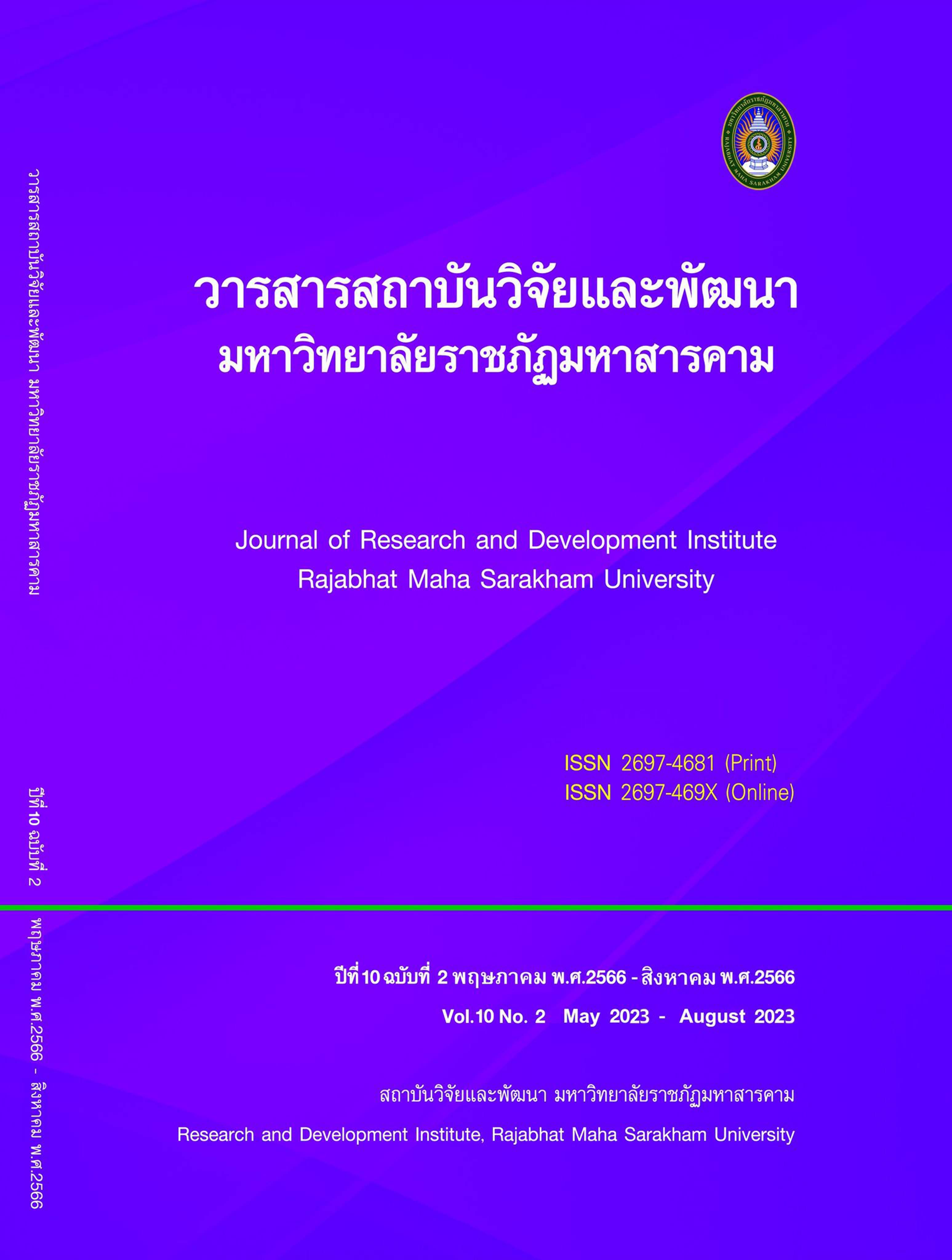Model of Enhancing the Quality of Citizenship for the Elderly
Keywords:
Enhancing, Quality of Citizenship, ElderlyAbstract
The purposes of this study were to : (1) Study the elements, indicators of the quality citizenship enhancement of the elderly. (2) Study the condition of enhancing citizenship, the quality of the elderly. (3) development a model for enhancing quality citizenship for the elderly. And (4) Try and evaluate of model for the elderly. The sample group were 30 seniors from the Elderly Club. The research instruments were: The interview form, The questionnaire on the condition, Model for enhancing the quality of citizenship for the elderly, and activities for enhancing for the elderly. The statistics used were percentage, mean, standard deviation.
The research results were found that : (1) Components and indicators for enhancing the quality of citizenship of the elderly from the synthesis of qualitative data from 2 case studies was found that there were 7 important components as follows: 1) There is learning management and knowledge transfer between the elderly through appropriate activities according to their potential and knowledge is passed on to the older generations. 2) The elderly have good physical health care, good mental health, and good quality of life. 3) The elderly are strong, have a volunteer spirit, and are creative in doing activities. 4) The elderly are competent in the economy. working with extra income 5) The elderly have morals and ethics as good role models. 6) Elderly people are involved in group management and have social responsibility. And 7) The use of technology to adjust the environment for the elderly to be stable convenient and safe. (2) Conditions for enhancing the quality of citizenship for the elderly Overall was at a high level. (3) model of enhancing the quality of citizenship for the elderly was a training based on the principles of SMART BUDDY Model (SBM Model) with five key goals: SMART (Specific/ Measurable/ Acheiverable/ Realistic /Timely), and activities to enhance the quality of the elderly's citizenship (Activities) include training, recreation, volunteer, and important elements in organizing activities for enhancing the quality of the elderly's citizenship It consists of five features: BUDDY (Behavior / Understanding / Discovery / approach Development / Yield, and appropriateness of Models Overall, was at a high level. and (4) opinions on activities to enhance the quality of the elderly's citizenship. at a high level and comparative results of enhancing citizenship quality of the elderly Before and after using the model was found that after training was significantly higher than before training was at the .05 level.
References
Boontos, K. and Nantabutr, K. (2017). Happiness, Suffering and Mental Health of the Elderly in a Community in the Upper North of Thailand. Journal of the Psychiatric Association of Thailand, 62(3), 257-270.
Bruner, J.S. (1956). The Course of cognitive Growth. America Psychologist. 19: 1-75.
Cabinet Secretariat. (2017). Constitution of the Kingdom of Thailand B.E. 2017. Bangkok: Secretariat of the Cabinet.
Department of Administration. (2018). Statistics report on population and housing for the year 2017. Bangkok: Department of Administration.
Doran, G. T. (1981). There’s a S.M.A.R.T. Way to Write Management’s Goals and Objectives. Management Review, 70, 35-36.
E. Steinwender. (2016). Setting SMART Marketing Objectives. MAIEUTYK.
Khon Kaen Provincial Statistical Office. (2020). Report of the 2020 Household Socio-Economic Survey, Khon Kaen Province. Khon Kaen : Khon Kaen Provincial Statistical Office.
Newmam, William H. (1950). Administration Action . Englewood Cliffs, New Jersey : Prentice – Hall.
Office of the National Economic and Social Development Board. (2014). Annual Report. Office of the National Economic and Social Development Board. Bangkok : Office of the National Economic and Social Development Board.
Othkanon, P. (1994). A study of nursing needs of the elderly. in clubs and homes for the elderly. Bangkok : Chulalongkorn University.
Rakphong, S. et al. (2016). Roles of local government organizations in the development of the quality of life of the elderly. in Muang Sam Sip District Ubon Ratchathani Province Rommayasan. 14(3), 123-130.
Robert J. Havighurst, (1960), Human Development and Education. Longmans, Green. New York.
Sajjasophon, R. (2013). Educational concepts for the development of performance in the elderly. Kasetsart Science Journal Social Sciences. 34(3), 471 – 490.
Semamon, W. (2013). Participation in the development of recreational activities for the elderly in Phra Nakhon Si Ayutthaya and Ang Thong Provinces. Phra Nakhon Si Ayutthaya : Phra Nakhon Si Ayutthaya Rajabhat University.
Srihaphak, S. (2013). Elderly people and their caregivers: Vulnerability of aging society under cultural change in Thailand. Nonthaburi : Health Systems Research Institute.
Yodpet, S. (2010). Integration of long-term care systems for the elderly. Bangkok: Jprint.
Downloads
Published
How to Cite
Issue
Section
License
Copyright (c) 2023 วทัญญุตา ธวัชโชติ, วิมลมาศ ปฐมวณิชกุล, ชยากานต์ เรืองสุวรรณ

This work is licensed under a Creative Commons Attribution-NonCommercial-NoDerivatives 4.0 International License.
Articles that are published are copyrighted by the authors of the articles







